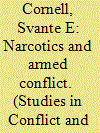| Srl | Item |
| 1 |
ID:
157721


|
|
|
|
|
| Summary/Abstract |
Much has been written and published about the 25 January 2011 Egyptian revolution from the perspective of contemporary history and political science. Much less attention has focused on social policy. I am unaware of any scholarly material that has dealt with illicit drugs during the critical 2011–2016 period, yet increasing drugs consumption provided a social backdrop to the events of that period. This paper identifies historical trends in illicit drugs consumption over the course of the last century to the beginning of the Arab Spring. During much of this period hashish was the drug of choice. This paper argues that drug consumption was on the rise in Egypt well before the downfall of President Husni Mubarak in February 2011, but that it has grown markedly since the ousting of the former president. It will ask which have been and are the drugs of choice in contemporary Egypt. It will further ask how this composition has changed and why, giving special focus to the relatively new mass, opioid drug, Tramadol.
|
|
|
|
|
|
|
|
|
|
|
|
|
|
|
|
| 2 |
ID:
076939


|
|
|
|
|
| Publication |
2007.
|
| Summary/Abstract |
The link between armed conflict and the production and trafficking of illicit drugs has been much noted in the popular literature, and recent research tentatively indicates a link between lootable resources, including narcotics, and conflict duration. Yet the specific dynamics of the linkage between narcotics and conflict remain poorly understood. Evolving theory on the link between organized crime and terrorism enhances and supplements the debate on economic incentives in civil war, proposing mechanisms whereby insurgent groups interact with narcotics production - a crime-rebellion nexus. Studies of nine major narcotics-producing areas indicates strong support for this nexus. Rather than generating or being generated by drug cultivation, armed conflict qualitatively and quantitatively transforms existing drug cultivation. Importantly, armed conflict is itself deeply affected by the narcotics industry, which tends to strengthen the capacity of insurgent movements while weakening that of the state. A momentous aspect of the crime-rebellion nexus is the effect that the drug industry tends to have on the motivational structures of insurgent groups: criminal involvement in some instances creates an economic function of war and vested interests in the continuation of armed conflict. This has substantial implications for strategies to resolve armed conflict involving the production and trafficking of illicit drugs
|
|
|
|
|
|
|
|
|
|
|
|
|
|
|
|
| 3 |
ID:
162169


|
|
|